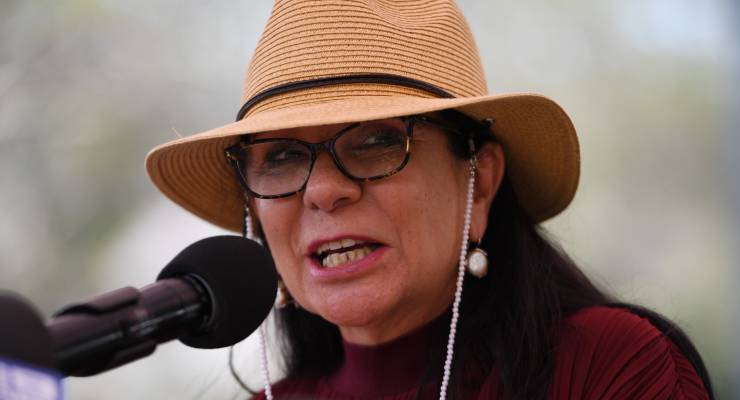
Labor has held early discussions on its preparations to begin work on treaty and truth-telling, even as the fate of its Voice to Parliament referendum hangs in the balance.
The government is understood to be preparing for work on a Makarrata commission, after Treasurer Jim Chalmers set aside $5.8 million in Labor’s October 2022 budget.
Indigenous Australians Minister Linda Burney has begun early discussions about the commission with Greens Senator Dorinda Cox, the party’s new First Nations spokesperson, who told Crikey the conversations last week had been “constructive”.
Burney’s office offered sparse context on the government’s plans, saying its election commitments remain unchanged and that the budget accommodates early work on a Makarrata commission.
Prime Minister Anthony Albanese promised voters when he was elected last year that his government would implement the Uluru Statement in full. Labor’s policy promises to develop a national framework for treaty-making that accommodates state and territory processes.
The move could soothe tensions between the government and critics who would prefer to see truth and treaty come before Voice, signalling Labor’s confidence in a referendum win — likely to be held between October and December.
Independent Senator Lidia Thorpe, an outspoken proponent of reordering the Uluru Statement to prioritise truth and treaty before a Voice to Parliament, has yet to receive an invitation to discussions.
While Albanese was in the Western Australian town of Port Hedland for a federal cabinet meeting this week, Opposition Leader Peter Dutton and opposition spokesman on Indigenous Australians Julian Leeser were drumming up concerns over the government’s “failure” to address regional “issues about violence, health and safety” across the state.
Leeser hasn’t been brought in on discussions about the government’s early work on the Makarrata commission either, which sources claimed symbolises the absence of “proper processes” around the government’s handling of the Voice so far.
“At the same time, the prime minister’s signature policy of an Indigenous Voice is languishing because of his unorthodox approach with no detail and no proper process to bring Australians with him,” Leeser said.
“And now he is talking about treaties.”








“Independent Senator Lidia Thorpe, an outspoken proponent of reordering the Uluru Statement to prioritise truth and treaty before a Voice to Parliament, has yet to receive an invitation to discussions. ”
Why would you invite her?
She has form for storming out if she doesn’t get her way, and she just dealt herself out of being able to influence with a block of voters and their wide army of voters.
Now she’s one of 4 Senators the gov need to find 2 votes from to pass some legislation, and she has no established backing from the public – as far as I’m aware there was no large split in the Greens membership to follow her, just a local council Green who also left party.
Although many a journo told us how Thorpe and her sister’s Invasion Day marches would do serious damage to The Voice, The Guardian reported crowds didn’t cheer for anti-Voice sentiments and couldn’t find anyone who had decided to vote against it based on the rallies.
Thorpe doesn’t represent who she was elected by, she’s not an honest negotiator(storms out), her messaging is rejected by public at rallies and she has no voter base. Why would you invite her?
Dutton and Leeser, as authors and perpetuators of the violence, health and safety issues mentioned, do not deserve to be quoted here. They are the latest in a long line of blind wreckers. To the detriment of everybody.
I suspect Albanese knows that the LNP wont support the yes case in thr forthcoming referendum. Not having bi partisan support it will fail. So Albanese is actually working on Plan B.
Wow! An acknowledgment that the “the Voice” is touch and go! It’s gone.
On the contrary, this article suggests the opposite: that the Government is already planning the next steps towards treaty and truth that will follow after a successful referendum.
“Prime Minister Anthony Albanese promised voters when he was elected last year that his government would implement the Uluru Statement in full. Labor’s policy promises to develop a national framework for treaty-making that accommodates state and territory processes.
The move could soothe tensions between the government and critics who would prefer to see truth and treaty come before Voice, signalling Labor’s confidence in a referendum win ….”.